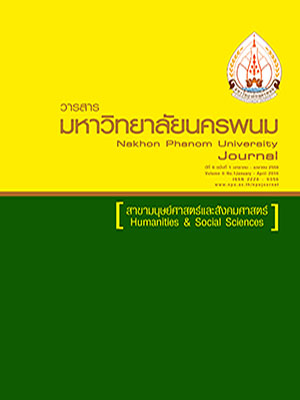ปัจจัยที่มีความสัมพันธ์กับบทบาทของผู้ดูแลในการดูแลผู้สูงอายุจังหวัดนครพนม
Main Article Content
Abstract
การวิจัยครั้งนี้มีวัตถุประสงค์เพื่อ 1) ศึกษาปัจจัยส่วนบุคคล ครอบครัวและสังคมของผู้ดูแลผู้สูงอายุ 2) ศึกษาบทบาทของผู้ดูแลในการดูแลผู้สูงอายุและ 3) ศึกษาความสัมพันธ์ระหว่างปัจจัยส่วนบุคคล ครอบครัวและสังคมของผู้ดูแลผู้สูงอายุกับบทบาทของผู้ดูแลผู้สูงอายุกลุ่มตัวอย่างได้แก่ผู้ดูแลผู้สูงอายุในจังหวัดนครพนมจำนวน 400 คน ได้มาจากการสุ่มแบบหลายขั้นตอน เครื่องมือที่ใช้เป็นแบบสอบถามประมาณค่ามีค่าความเชื่อมั่นทั้งฉบับเท่ากับ 0.86 สถิติที่ใช้ในการวิเคราะห์ข้อมูลได้แก่ ร้อยละ ค่าเฉลี่ย ส่วนเบี่ยงเบนมาตรฐานไคแสควร์และสัมประสิทธิ์สหสัมพันธ์ของเพียร์สัน (Pearson,s Product Moment Correlation)
ผลการวิจัยพบว่า1) ปัจจัยส่วนบุคคลของผู้ดูแลผู้สูงอายุส่วนใหญ่เป็นเพศหญิง อายุเฉลี่ย 41.36 ปี ระยะเวลาเฉลี่ย ในการดูแลผู้สูงอายุ 11.65 ปี รายได้เฉลี่ยของครอบครัว 9,157 บาทต่อเดือนสถานภาพสมรส การศึกษาระดับมัธยมศึกษา รายได้มีพอใช้ ไม่มีโรคประจำตัว และเกี่ยวข้องเป็นบุตรของผู้สูงอายุมากที่สุด ปัจจัยด้านครอบครัวโดยรวมอยู่ในระดับปานกลาง ด้านทรัพยากรของครอบครัวและด้านการเผชิญปัญหาในครอบครัวอยู่ในระดับปานกลาง ด้านความมั่นคงภายในครอบครัวอยู่ในระดับมาก ปัจจัยด้านสังคมโดยรวมอยู่ในระดับมาก ด้านการสนับสนุนจากบุคคลภายนอกครอบครัว และการสนับสนุนจากรัฐอยู่ในระดับมาก 2) บทบาทของผู้ดูแลในการดูแลผู้สูงอายุจังหวัดนครพนมโดยรวมและรายด้านอยู่ในระดับมาก 3) ความสัมพันธ์ระหว่างปัจจัยส่วนบุคคลกับบทบาทการดูแลผู้สูงอายุเป็นดังนี้ อายุมีความสัมพันธ์ทางลบ ระยะเวลาในการดูแลผู้สูงอายุมีความสัมพันธ์ทางบวก ปัจจัยที่มีความสัมพันธ์กับบทบาทการดูแลผู้สูงอายุได้แก่ ความเพียงพอของรายได้และความเกี่ยวข้องกับผู้สูงอายุ ส่วนปัจจัยที่ไม่มีความสัมพันธ์กับบทบาทการดูแลผู้สูงอายุได้แก่ เพศ ระดับการศึกษา สถานภาพสมรสและภาวะสุขภาพ ปัจจัยด้านครอบครัวทั้งโดยรวมและรายด้าน ปัจจัยด้านสังคมโดยรวมและรายด้านมีความสัมพันธ์ทางบวกกับบทบาทของผู้ดูแลในการดูแลผู้สูงอายุอย่างมีนัยสำคัญทางสถิติที่ระดับ .01
The purpose of this study were: 1) investigate personal, familial and social factors of the caregivers for the elderly, 2) to examine the role of caregivers in caring for the elderly, and 3) to inquire into the relationship between the personal, familial and social factors of the caregivers for the elderly and the role of caregivers in caring for the elderly. The sample was 400 caregivers for the elderly in Nakhon Phanom province selected by multi-stage random sampling. The instrument used was a rating scale questionnaire whose entire reliability coefficient was 0.86. Statistics used in data analysis were percentage, mean, standard deviation, chi-square, and Pearson’s product moment correlation coefficient.
The findings revealed as follows: 1) the personal factors of caregivers for the elderly showed that most of them were females with the average of 41.36 years of age. The average length of time for giving care for the elderly was 11.65 years. The average family income per month was 9,157 baht per month. Most of them got married, had educational attainment at secondary level, had enough income to spend, had no chronic illness, and were a child of the elderly. The overall familial factor was at moderate level. The resources for family and the family problems encountered were at moderate level. Security within the family was at high level. The overall social factor was at high level. The support from people outside the family and the state support were at high level. The overall role of caregivers in caring for the elderly in Nakhon Phanom province and its each aspect were at high level. 3) The relationship between the personal factors and the role of caregivers in caring for the elderly was as follows : The age was negatively related to the role of them. The length of time for giving care to the elderly was positively related to the role of them. The factors associated with the caregivers’ role in caring for the elderly were: adequacy of income and relation with the elderly. The factors that were not related to the caregivers’ role in caring for the elderly were sex, educational attainment, marital status, and health condition. The overall aspect of family factor including its each aspect and the overall aspect of social factor including its each aspect were significantly related to the caregivers’ role in caring for the elderly in a positive direction at the .01 level.


